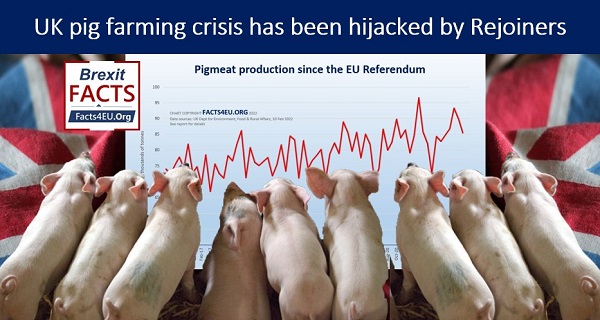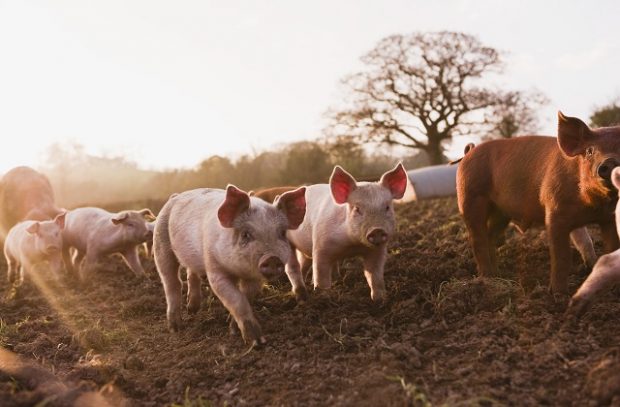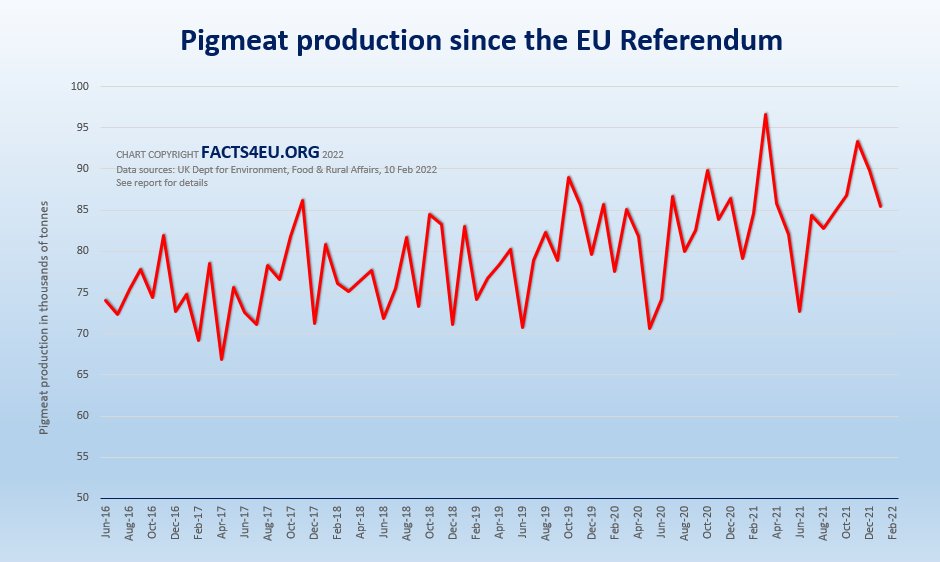Another anti-Brexit myth exposed – pigmeat production up 15.5% since EU Referendum
UK pig farming crisis has been hijacked by Rejoiners to concoct a false narrative

Montage © Facts4EU.Org 2022
The DEFRA Farming Minister Victoria Prentis MP has responded to the worst crisis faced by pig farmers in living memory by hosting a Crisis Summit earlier this month.
This follows on from measures introduced by the Government last year in response to the effect of the Covid crisis on the farming industry.
Claims of tens of thousands of healthy pigs being needlessly culled solely because of Brexit do not bear scrutiny. The pig farming crisis is real, with great costs and causing personal distress to farmers – but blaming Brexit alone is a lazy convenience that risks ignoring the many contributory factors and leaving them unresolved.
In fact, pigmeat production is up 8% year-on-year and up 15.5% since the EU Referendum
Brexit Facts4EU.Org Summary
Pigmeat production
According to the latest figures published by DEFRA on 10 February 2022
- Pigmeat production was 86,000 tonnes, 8.1% higher than in January 2021
- Pigmeat production in January was 15.5% higher than in June 2016 – when the EU Referendum took place
- Mutton and lamb production was 21,000 tonnes, 8.5% higher than in January 2021
© Brexit Facts4EU.Org 2022 - click to enlarge
The SIPS payment has also been increased from £3 to £10 per pig and will run until 31 March, or before if the limit of 100,000 pigs slaughtered is reached sooner.
There is also a review into the British pork industry supply chain so the various factors that cause bottlenecks and bring uncertainty to farmers can be addressed.
The UK Government has moved to ease the plight of pig farmers. A range of solutions were required to deal with the Covid-19 pandemic disrupting markets and causing shortages of materials and labour. This added to the uncertainty caused by the long drawn-out departure from the EU that was especially made difficult by Remainers trying to derail the democratic process – including a parliament that refused to accept the referendum result.
Environment Secretary, the Rt Hon George Eustice MP, said:
“A unique range of pressures on the pig sector over recent months such as the impacts of the pandemic and its effect on export markets have led to the temporary package of measures we are announcing today. This is the result of close working with industry to understand how we can support them through this challenging time.”
- Rt Hon George Eustice MP, Environment Secretary, 15 Oct 2021

As a result of the summit, further changes have been made to the Government’s Slaughter Incentive Payment Scheme (SIPS) to help release more pigs into the commercial slaughtering process from a backlog that had been building up all of last year. SIPS makes additional payments to abattoirs so they will provide more butchers’ shifts, creating more throughput. Most importantly SIPS now covers pork meat destined for domestic consumption (which sells for higher prices) and not just pork for export or storage, which had not generated enough uptake.
What has been missed from much of the reporting and campaigning are the other factors beyond Brexit making differences to workers’ recruitment due to the end of freedom of movement.
Factors contributing to the pig farming crisis
Sows have two litters a year making it very difficult for pig farmers to adjust when the market contracts, resulting in an abundance of pigs. Without enough capacity at the abattoirs, space is required to keep them and costs mount for the feeding and care. Eventually pig farmers are faced with having to cull and dispose of the pigs without sale.
The impact of Covid-19 pandemic and the restrictions that it resulted in are often not even mentioned by Rejoiner critics of Brexit – yet the wholesale disruption to workforces by absenteeism, self-isolation, genuine illness and the need for overseas workers to be with their families cannot be ignored.
It is also forgotten that the structure of Britain’s slaughterhouse industry is a direct consequence of years of EU directives bringing the closure of local abattoirs in preference to fewer larger ones. This has been accompanied with a consequential drop in training of British apprentices and a suppression of wages – a story very similar to that of HGV drivers. The industry will need time to train workers and adjust to the new circumstances – but it presents opportunities that are never mentioned.

© DEFRA 2022
A global disruption to CO2 gas caused by rising energy prices threatened to halt production at a British producer responsible for 60% of CO2 gas supply, which is used in the slaughter process, packaging, and chilling stages of meat production. Both of its plants were going to close having become unviable but one has now been kept open taking the pressure off the food industry. Problems of CO2 shortages were Europe-wide and not just local to the UK.
African Swine Fever has become a significant problem in Germany resulting in bans of the movement of pigs. The loss of Chinese markets to many producers and the impact of Chinese bans on German pork because of African Swine Fever found in some German pigs has meant a greater supply of pork meat staying in Europe, depressing the price and impacting on UK prices – and exports. All at a time when it was needed least.
The combination of these various factors is what caused markets to be disrupted and the capacity of processors to slaughter and process pigs become constrained – leading to thousands of pigs backing up on farms.
Observations
Pig farmers need help to adjust – like other industries were helped during the pandemic
There is no doubt that Brexit will bring opportunities for farmers – and that includes pig farmers – but it cannot be overnight and no-one was expecting the Covid-19 pandemic to come along at the same time as Brexit.
The change in work visa requirements, although not an obstacle in themselves, would always have required some adjustment but have clearly been a greater challenge due to the pandemic causing many workers to go home and not come back.
That said there is both a real need to train young British workers in the necessary skills instead of relying on imported labour, and there is a real opportunity to win more of the home market which currently imports 40% of its consumption. These should be the goals of the UK Government – building greater self-reliance and resilience into our food supply chain.
None of this is served by Rejoin campaigners adopting their megaphone narratives of blaming EVERYTHING on Brexit. Scarcity and disruption is much more nuanced than is claimed and had Brexit not happened there would undoubtedly still have been shortages and problems caused by the pandemic, the energy crisis and events in other markets such as China and Germany – the latter suffering pig stocks at a 25-year low. Nobody is blaming that on Brexit in Germany...
Could the British Government be doing more to help? Most likely, but simply blaming Brexit is an unhelpful distraction and loss of focus. We should call it out for what it is, using the suffering pig farmers for their own agenda when in the past the same EU supporters would gladly cheer on EU regulations that made life for British pig farmers all the harder.
Our research and campaigning does not come cost free, nor do we have the resources of the Remainers and Rejoiners…
Facts4EU.Org needs your financial support today
We are a 'not for profit' team (we make a loss) and any donation goes towards the actual work, not plush London offices, lunch or taxi expenses, or other luxuries of some organisations.
We badly need more of our thousands of readers to donate – no matter how small an amount it all helps. Could this be you, today? Maybe you've been thinking about it, but just haven't got around to doing it? If so, let us reassure you. It's quick and easy and we use two highly secure payment providers. And we do NOT ask you for further donations if you donate once - we just hope that you keep supporting us. Your donation stays anonymous unless you tell us otherwise.
Please don't assume that other people will keep us going - we don't receive enough to survive and we need your help today. Could you help us?
Most of our readers are well-informed and appreciate our fact-based articles, presented in a way you won't see anywhere else. If you value reports like the one above, please help our work with a donation. We have far more to do in researching, publishing, campaigning and lobbying Parliament than we have in terms of the financial resources to fulfil these tasks. We badly need funding to continue - we rely 100% on public donations from readers like you.
If you believe in a fully-free, independent, and sovereign United Kingdom, please make a donation now. It’s quick, secure, and confidential, and you can use one of the links below or you can use our Donations page here. You will receive a personal, friendly ‘thank you’ from a member of our team within 24 hours. Thank you for reading this.
[ Sources: Department for Environment, Food & Rural Affairs | Pig World | The Grocer | Farming UK ] Politicians and journalists can contact us for details, as ever.
Brexit Facts4EU.Org, Tuesday, 22 February, 2022
Click here to go to our news headlines
Please scroll down to COMMENT on the above article.
And don't forget to actually post your message after you have previewed it!
Since before the EU Referendum, Brexit Facts4EU.Org
has been the most prolific researcher and publisher of Brexit facts in the world.
Supported by MPs, MEPs, & other groups, our work has impact.
We think facts matter. Please donate today, so that we can continue to ensure a clean Brexit is finally delivered.
Paypal Users Only - Choose amount first
Quick One-off
Monthly



Something to say about this? Scroll down for reader comments